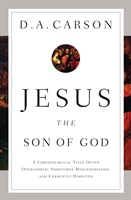Most of our readers are familiar with Dr. D.A. Carson, Research Professor of New Testament at Trinity Evangelical Divinity School and co-founder (with Tim Keller) and president of The Gospel Coalition. Recently we interviewed him concerning his recent book, Jesus the Son of God, in which he takes up the complex question, What does Scripture mean when it tells us that Jesus is the Son of God?
Table of Contents:
1 “Son of God” as a Christological Title
2 “Son of God” in Selected Passages
3 “Jesus the Son of God” in Christian and Muslim Contexts
Books At a Glance (Fred Zaspel):
Please describe for our readers, briefly, the issue(s) or factor(s) that gave rise to this book. How did the current controversy over “son of God” in Bible translation come about?
D.A. Carson:
The original impetus for the book did not arise out of any recent controversy, but out of longstanding study of how the NT uses the OT – not least how Christological titles “work” in the Bible. One cannot read the quotations in, say, Heb 1:5, not to mention passages such as Psalm 8 and Job 1, without recognizing that “son of God” is a complicated designation with different meanings in different contexts.
One cannot read the quotations in, say, Heb 1:5, not to mention passages such as Psalm 8 and Job 1, without recognizing that “son of God” is a complicated designation with different meanings in different contexts.
Theologically, what exactly do we mean when we assert that God has a son? I had decided to write something on this subject when two things happened: the debate over the appropriate way to translate this expression in Muslim contexts exploded into the evangelical world, and a seminary invited me to give some lectures on the subject. So I settled down in front of my keyboard, and this little book was the result. The controversy over appropriate translations of the expression came about when what might be called looser or less direct translations, which were already widely circulating, became well known, and many missionaries, converted Muslims, and biblical scholars began to sound the alarm. That precipitated a lot of traffic in the digital world, but much of the discussion was too narrowly linguistic and insufficiently exegetical, theological, and pastoral. So I tried to fill in some of the holes.
Books At a Glance:
Is this a new controversy in the history of the church? Is this only an issue in Muslim contexts? Or does it extend beyond?
D.A. Carson:
The debate over how to translate “son of God” is today primarily focused in Muslim contexts, but underlying it are huge questions in several domains. I mention two: (1) For many, this question is tied to a lot of evaluation about what used to be called contextualization, about “C5” missions (for those who read in these areas!), or, conversely, about how to be faithful to the one gospel once for all delivered to the saints (Jude 21) as that gospel crosses languages and ethnicities. (2) Theologically, we are dealing with the person and work of Christ, with the nature of the Trinity, with confessional formulations across the centuries. In that sense, the scale of the issue is huge.

Books At a Glance:
What considerations make this issue important? What is at stake? And just how important is it in terms of ecclesiastical fellowship?
D.A. Carson:
Many Christians judged the issue so important that mission agencies that did not review their policies lost support from a variety of confessional churches. I think that was a healthy development: mission agencies ought to be accountable to supporting churches. One does not wrestle with the doctrine of God without perceiving that huge issues are at stake! In this case, many Christians judged, rightly as far as I can see, that the desire to attract more Muslims to Jesus by modifying titles like “son of God” (on the ground that they were being misunderstood by Muslims) was producing a sort of hybrid “convert,” half Muslim and half Christian, and not quite either. Eventually the topic becomes a gospel issue. More broadly, my book tries to show how to move from careful exegesis to theological formulation. Too often commentators explain local texts but avoid rich theological synthesis, while systematicians wrestle with the theological syntheses without going back to the biblical texts. I would like to see more commentators moving from exegesis to constructive theology, and more systematicians returning to exegesis and biblical theology, informed by historical theology, on their way to normative theological formulations.
Books At a Glance:
You demonstrate at some length that “sonship” language in Scripture has a broad range of connotations. Can you summarize briefly the theological significance of the expression “Son of God” with reference to Jesus?
D.A. Carson:
Not easily! “Son of God” is used of the Davidic king (2 Sam 7), and Jesus is the ultimate Davidic king, the Messiah. “Son of God” is used of Adam (see Luke’s genealogy!), and Jesus is the ultimate “Man.” Old covenant believers and New Testament Christians are said to be “sons of God” – properly reflecting him in all the ways that his image-bearers can reflect him, without pretending to be God. Israel collectively can be called God’s son (Exodus 4; Hos 11:1) – but then the same passages can be applied by NT writers to Jesus as the ultimate Israel. But in some passages, Jesus is the unique Son of God – he perfectly reflects his Father in ways that only a person who is truly God could (e.g. John 5:16-30; Heb 1:1-4). “Son” language is used of the pre-incarnate eternal Son (e.g., John 3:17) as well as of the incarnate Son. Sometimes several of these usages come together in one short context. The expression is marvelously rich.
Books At a Glance:
Have you been encouraged with the response to your book? And is there evidence yet that it will have impact with regard to Bible translation policies?
D.A. Carson:
In God’s mercy, I think this little book is doing some good and helping to bring clarity and faithfulness to some debates. I am very grateful to God for the privilege of contributing in this way.

